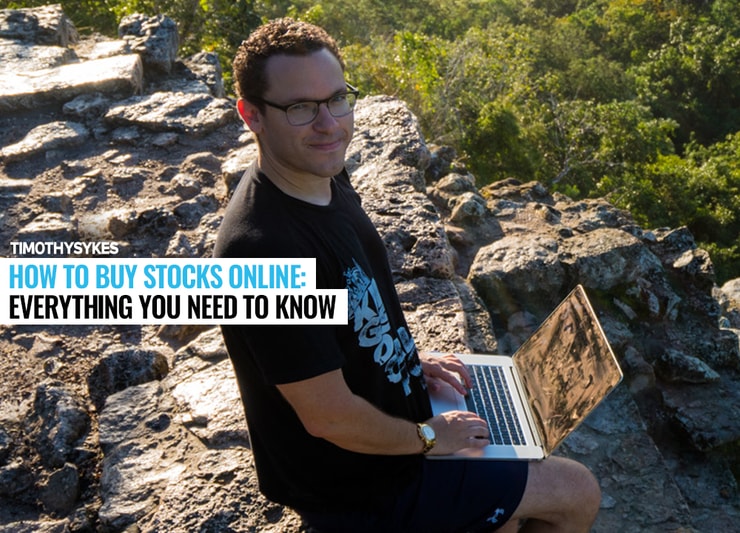Wanna buy stocks online? Well, that’s easy. You could literally get started in minutes.
But if you want to do it right … well, that’s a bigger conversation.
Once upon a time, I was just a know-it-all kid who thought he’d strike it big in the stock market. I did become a millionaire … but not without my fair share of failures and mistakes.
I ultimately found success, but I also understand why so many traders fail.
It’s SO important to find a system that works for you and to continue to refine it. That won’t happen overnight.
I tried my hand at the hedge fund world, but as you can read in my autobiography, my method wasn’t scalable — meaning that my strategy for trading low-priced stocks didn’t work as well with a bigger account.
Hedge fund management wasn’t the best use of my knowledge or time. Now, I’m a trader/teacher so I can help other emerging traders. I want to be the mentor that I never had.
Trading isn’t necessarily difficult. It doesn’t require an advanced math degree. But it does require diligence and lots of grunt work.
Want to become a self-sufficient trader? It takes time and effort, and even then there are no guarantees. But by educating yourself, you’re building a much stronger foundation than the countless traders who blindly dive in and learn the hard way — with painful, costly losses.
Ready to start learning? Let’s talk about something every new trader should know all about: how to buy stocks online.
Table of Contents
- 1 Why Trade Stocks?
- 2 Basic Stock Trading Terms
- 2.1 Buy
- 2.2 Sell
- 2.3 Bid
- 2.4 Ask
- 2.5 Bid-Ask Spread
- 2.6 Bear / Bull Market
- 2.7 Blue-Chip Stock
- 2.8 Broker
- 2.9 Day Trading
- 2.10 Dividend
- 2.11 ETF
- 2.12 Exchange
- 2.13 Execution
- 2.14 Float
- 2.15 Forex
- 2.16 Going Long
- 2.17 IPO
- 2.18 Liquidity
- 2.19 Margin
- 2.20 Market Capitalization
- 2.21 Moving Average
- 2.22 Mutual Funds
- 2.23 Portfolio
- 2.24 Quote
- 2.25 Rally
- 2.26 Volatility
- 2.27 Volume
- 2.28 Sector
- 2.29 Stock Order: Choose Your Stock Order Type
- 2.30 Stock Symbol
- 2.31 Yield
- 3 How to Buy Stocks Online
- 4 Bonus: How to Buy Stocks Online Without a Broker
- 5 Conclusion
Why Trade Stocks?

There are plenty of reasons why I think trading stocks is worth the time and effort. Here are some of the biggies…
Growth Potential
Say that you’ve got some money. What should you do with it?
Well, you could put it under your mattress, but it won’t do much for you there.
You could put it in your bank account, too. The money is safer … but it really won’t be doing much more for you. Maybe a few cents in interest per month.
With stocks, you’ve got a potential for much greater growth. It’s an opportunity to have your money work for you.
Income
If you develop a consistent system of trading, it’s possible to generate income over time.
Let’s get straight on this: I’m not talking about home runs or hundreds of thousands of dollars in a single trade.
That can happen, but don’t count on it. Most trading income is going to come in through small wins. The good news? These small wins add up over time.
And as time goes on and your skills and account grow, your ability to generate income from trading can grow, too.
More Breaking News
- ABP’s Stock Movement Signals Market Concerns Amid Broader Trends
- Under Armour Battles Data Breach Amid Revenue Challenges
- AppLovin Gains as Analysts Highlight Growth Potential Amid E-commerce Boom
- ALAB Stock Climbs Amid Strategic Moves and Strong Financial Indicators
Flexibility
All you need to trade is a laptop, a brokerage account, and an internet connection. But it doesn’t matter where you actually do it. Honestly, you could even do it from your phone!
This flexibility is, for me, one of the greatest advantages of trading. I can trade from anywhere, which is great because I love going to beautiful places like Santorini or Australia or Positano. And I’m always on the move with Karmagawa projects.
I have the ability to trade and teach from anywhere … and I love it. If you want to break out of the 9–5 box, trading might be a highly appealing undertaking!
Control
I joke that I’m a “retired trader.” This is a strategy that works for me … to actually jump into a trade, it has to be such a great setup that it draws me out of retirement.
From there, I have a ton of control. I can set the entry and exit points for trades. I know where I’ll take profits or where I’ll cut losses if the trade doesn’t go my way.
Even if the stock doesn’t perform how I think it might based on my research, I still maintain a high level of control with trading. Trading rewards diligence!
Trading Challenge
I started my Trading Challenge to help up-and-coming traders find their stride.
I’m never going to promise you that you’ll get rich quick or that there are any guarantees in the stock market.
But I can teach you the skills I’ve learned over 20+ years in the stock market … skills and techniques that have made me a millionaire.
In the Challenge, you’ll have access to a ton of resources like an extensive video library, webinars, chat rooms, and live trading events…
… just to name a few.
Are you ready to invest in your education to help you make smarter trading choices? Consider applying today.
Basic Stock Trading Terms
Yeah, trading has its own lingo. Here’s a little glossary of some must-know terms:
Buy
To buy shares of a stock.
Sell
To sell the shares of stock you’ve purchased. Usually, you’re selling either because you’ve reached your goal or you want to cut your losses.
Bid
The current price that buyers are willing to pay for stock shares.
Ask
The current price buyers are asking when selling stock shares.
Bid-Ask Spread
The difference between the bid and ask prices. This has to be resolved for a transaction to go through.
Bear / Bull Market
- Bear market: Pessimistic market conditions where investor confidence is low and stock prices are expected to fall.
- Bull market: Optimistic market conditions where investor confidence is high and stock prices are expected to rise.
Blue-Chip Stock
These are big, industry-leading companies. They typically offer reliable dividend payments.
Broker
A person or group that buys or sells securities on your behalf.
Day Trading
Buying and selling a security within the same trading day.
Dividend
The portion of a company’s earnings that are paid on an annual or quarterly basis to shareholders. Not all stocks deliver dividends.
ETF
Short for exchange-traded fund. ETFs can be bought and sold like stocks.
Exchange
The marketplace for stocks … for example, the New York Stock Exchange and Nasdaq.
Execution
When an order to buy or sell is complete. If you put in an order to sell 100 shares, this means that all 100 shares have been sold. If only 90 shares were sold, the order is considered partially executed.
Float
Also called “public float.” The number of shares that are available for public trading, minus those claimed by insiders.
Forex
Short for foreign exchange. This involves trading foreign currencies.
Going Long
Executing a trade hoping that the stock will increase in price.
IPO
Short for “initial public offering.” This happens when a private company goes public on the stock market.
Liquidity
How quick/easy it is to buy or sell a stock.
Margin
This type of account lets you borrow money from a broker (like a loan) to purchase securities.
Market Capitalization
Also referred to as “market cap.” Refers to the market’s valuation of a company.
Moving Average
A stock’s average price per share during a specific time period. For example, the 50-day moving average or 200-day moving average.
Mutual Funds
A type of investment account where a fund manager will then invest your money in a variety of different securities.
Portfolio
Your personal collection of investments.
Quote
The stock’s latest trading price.
Rally
A fast increase in the price level, either of the market or a specific stock.
Volatility
How quickly a stock’s price goes up and down. The more rapid the movement, the greater the volatility.
Volume
The amount of shares being traded in a given day. This has a big impact on a stock’s liquidity.
Sector
A group of stocks within the same industry or business. For instance, the technology sector.
Stock Order: Choose Your Stock Order Type
Market Order
A market order is an order type where you execute as soon as possible, at the current market price. I don’t suggest using market orders.
Limit Order
A market order lets you provide instructions to only execute at or under a purchase price, or at or above a sale price. Seconds can matter in the market, so using limit orders helps guarantee that you’re buying or selling for a price that feels good to you.
Stock Symbol
The symbol used to represent a stock — also known as a ticker.
Yield
The measure of return on an investment received through dividends.
How to Buy Stocks Online

The good news is that buying stocks has never been easier. Once upon a time, you had to call up your broker to execute trades. Now, you can do it from your computer or even your cell phone. Let’s talk about what you need to buy stocks online…
Open an Online Brokerage Account
Before you can buy or sell stocks, you’ll need a brokerage account.
What Are Stock Brokers?
Your stockbroker is almost like your agent in the stock market, executing trades on your behalf. Usually, there’s some sort of a fee for this service.
These days, most orders are executed online. However, there are many types of online stock brokers. Here are some to know:
Full-Service Brokerages
This is a broker who not only executes orders but can also provide investment advice and other services.
Online Discount Brokers
Brokers who carry out transactions at a discounted rate. Most discount brokers are online only.
Discount Brokers With Assistance
A discount broker that may provide some additional services.
Money Managers
These are professional managers who manage the accounts of individual or institutional investors.
What Do You Need to Open a Brokerage Account?
Usually, opening a brokerage account is about as involved as opening a bank account. That’s to say … not too complicated at all.
Typically, You’ll need to fill out a few forms and deposit some money in the account. Every brokerage is slightly different, though. Be sure to check any specific requirements or minimums before settling on a broker.
How to Pick the Right Stockbroker
Choosing a good stockbroker is extremely important if you want to pursue trading in the long term.
You want to trust the institution that’s handling your account, and you want to make sure that they’re executing your orders quickly and reliably.
There are a few things you should consider when researching a stockbroker. For more information, check out this post.
Best Online Stockbrokers for Beginners
There isn’t a single online broker that’s best for beginners, and there isn’t a single best place to buy stocks online.
It’s all about your personal needs. Choosing a broker is a personal decision and not one that should be taken lightly.
If you’re getting started, one thing that I strongly suggest looking for is a broker that has plenty of great charting tools. Some people have a stock screener and a separate brokerage account, but it’s nice to have both in one place.
StocksToTrade is an example of a stock screener that has broker integration, making it easy to execute trades right from the platform.
Best Stocks to Buy Online
You want to know what I wish traders would stop asking me?
“Tim, what’s a hot stock pick?”
Sorry. It just doesn’t work that way.
I could give you a stock pick right now. By the time I’d sent you an email or a text, it might already be obsolete. Or, you might not choose an appropriate entry or exit point.
There are plenty of alerts out there, including the ones that I send. But just because a stock is deemed worthy of watching doesn’t mean you should just go ahead and trade it.
You’ve got to do a ton of independent research to build a case for your trade. This involves fundamental and technical analysis.
Fundamental analysis is where you research the company, its finances, and consider things like the news and other factors that could affect a stock’s price.
Technical analysis is where you analyze the stock’s chart to see if there are patterns. I’m a huge fan of patterns, and I rely on technical analysis. But you need both to make really smart trading decisions.
To perform technical analysis, you absolutely need a stock screening platform. Once again, StocksToTrade is my pick. This is a powerful stock screener that lets you filter based on criteria you set — for instance, the biggest percent gainers.
Full disclosure: I was part of developing STT. So you can bet I rallied hard to have all of the screening tools I wanted on the platform!
Not only does STT let you evaluate charts, but it links to relevant news and even social media mentions for tickers. This means that setting up and maintaining a watchlist and doing your fundamental and technical analysis is a snap.
Bonus: How to Buy Stocks Online Without a Broker
Don’t like the idea of middlemen? Plenty of people are interested in how to buy stock directly … In my opinion, it’s really not worth the trouble. But everyone’s different, so I want to make sure you know about different options. Here are some ways to do it…
Direct Stock Purchase Plans
Also called DSPP for short, these are plans that let you buy stock right from a company … sometimes without a fee, and sometimes even at a discount.
However, you’ve got to read the fine print. Sometimes, you can pay setup fees, sales fees, or other charges that add up to more than just paying a broker’s commission. Plus, if buying DSPPs, you’d need to do it individually with every stock. In contrast, a brokerage account lets you buy all sorts of company stocks from one account.
Dividend Reinvestment Plans
Also called a DRIP. Really, this is an equity option that companies offer where you don’t receive dividends as cash, but they’re reinvested in the security. This can allow you to increase your position over time without paying extra transaction fees.
Other Specialty Accounts
There are some other ways to bypass brokers, but usually they’re limited to wealthier individuals or people with access to an asset management company.
My personal take? Broker fees generally aren’t that bad … focus on making smart trades and the fees are negligible. It’s when you overtrade or don’t think your decisions through that the fees will start burning holes in your pocket.
Conclusion

Buying stocks online doesn’t require much to get started. But if you want to do it effectively, there’s a lot to consider.
By doing things like taking the time to educate yourself on how the market works, researching brokers, and taking the time to learn what works for you as a trader, you can be leaps and bounds ahead of the many traders who fail.
Ready to take your trading to the next level? Consider joining my Trading Challenge.
Did you pursue an education before you started trading? If not, how did it work out for you? I’m curious … leave a comment!




Leave a reply